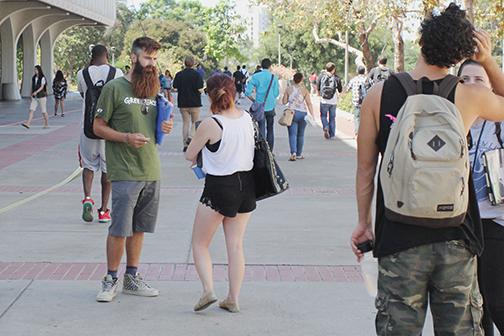We all know the situation. You’re walking down Campanile Walkway trying to get to class when you spot them. The clipboards, the matching t-shirts and the inevitable, “Do you have a minute for (random humanitarian cause)?” You already start thinking of excuses to tell the people asking for donations to prevent the oncoming guilt trip, but it’s futile; either you’ll feel guilty for ignoring them or you’ll feel guilty when they start spewing out facts as to why you should donate to their cause. But it’s time to stop. Stop making excuses to avoid these canvassers. You don’t need any reason to justify not wanting to talk to them.
If I had a dollar for every time a canvasser has tried to guilt trip me, I probably would be able to donate those 90 cents a day to impoverished children. I knew I was asking for trouble when I began looking for a canvasser on San Diego State’s campus just to prove to myself that they would pull out the guilt card, but when I found that SDSU was lacking canvassers on a particular Wednesday, I went to the only place that never fails: the Mission Valley Target. While this Target may not always have the lowest prices on all the hottest items, you can always count on encountering at least two Greenpeace canvassers asking if you care about the whales. Lo and behold, I had found them.
Before I talked to them, I wondered what kind of guilt trip they would use on me. Would it be the popular guilt trip about poverty or some natural disaster in which they convince me to give to such a worthy cause? Or would it be the default reminder that you could be doing more, in which they remind me that no matter how much money I’m already donating, I can always give more? I was about to find out.
The canvassers I walked toward were wearing matching red t-shirts with “Save the Children” printed in white text. My eyes made contact with one particular canvasser and all I remember from the ID hanging from his lanyard is that his name was George and he was born in 1990. As soon as we made eye contact and I walked remotely toward his direction he claimed that I look like someone who cares about children. Was he an expert on physiognomy (the practice of judging a person’s character by their face)? Could he really tell I care about children just by reading my face? Perhaps he could tell that I care about children, but he couldn’t tell that I was actually here on a mission to get something out of him. I had come to see if he would guilt trip me into donating for his cause, and boy did he try.
I stood there while he explained why I should give a monthly donation to Save the Children. He told me the basics, such as how many children lack basic resources and how reputable and efficient the program is. [quote]He was trying to inspire me to care, but I knew what he really wanted, my digits and a date. By that I mean the 16 digits and expiration date on my credit card. [/quote]But I had to let him down easy–you know, the old “don’t call me, I’ll call you” excuse. However, I did do more research on Save the Children like I promised him I would, and here’s what I found.
Acording to Slate, most street solicitors, or canvassers in this case, aren’t even volunteers.
Slate writes, “Most aren’t even employed by the charity directly but by an agency contracted to fundraise for them.”
The Riverfront Times reported that Save the Children canvassers receive a cut from the donations they solicit, earning 15 percent for “one-off” donors and 20 percent for “lifeline sponsors.” However, I also found from the Office of the Secretary of State that Save the Children does indeed devote 90 percent of its total expenses to program services, just like George said they did.
I assumed that canvassing was volunteer work, but now knowing they’re paid makes it easier to walk past them. Canvassing is a business. It’s a job. But I’m not here to question the motives behind canvassers. They could be canvassing because they need some cash or because they legitimately care about the cause they’re representing. [quote]All I know is that they’re trying to pitch me a sale that only buys moral gratification at most, and I can’t do anything with moral gratification.[/quote]
So when you’re walking down the Campanile Walkway trying to get to class, the library or wherever, keep something in mind. You aren’t an evil, malicious person for not giving a monthly donation. You aren’t the cause of all human suffering in the world and your money won’t ever prevent all human suffering. Most importantly, you aren’t required to make an excuse to not want to talk to a canvasser, so stop making excuses. You’re not a bad person for walking past them. Remember that canvassers really just want your digits and a date.










